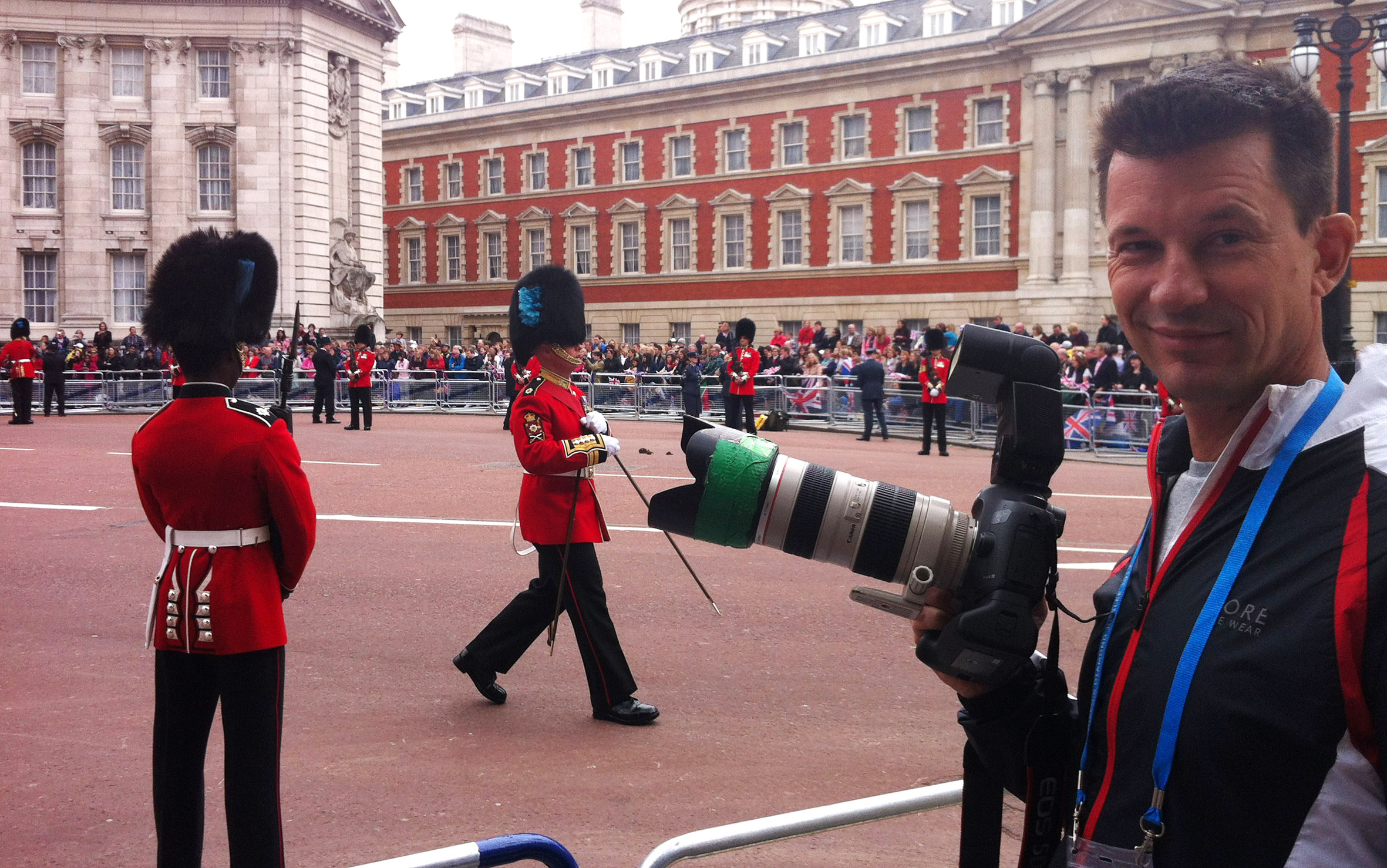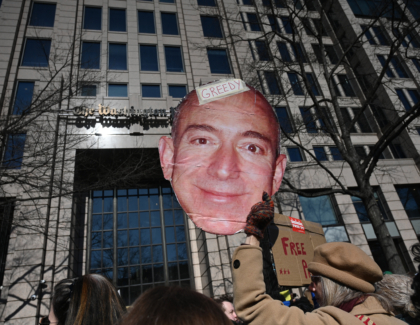Sign up for the daily CJR newsletter.
Over nine years have now passed since the kidnapping of British photojournalist John Cantlie in Syria, a hostage of the Islamic State group. That no real news of Cantlie’s fate has been forthcoming for years is disturbing.
Cantlie was abducted on November 22, 2012, along with his friend, American journalist Jim Foley, as the two returned from a weeks-long reporting trip to the rebel-held provinces of Aleppo and Idlib. En route back to the Turkish border and safety, their taxi was stopped and both men were forced out and made to lie on the ground by a cell of secretive foreign jihadis–at least one of whom Cantlie had seen earlier that day, in an internet cafe in rebel-held Binnish.
“Come with us, it will only take five minutes,” they were told. Nothing was heard of the pair until 2014, when Foley popped up on an Islamic State propaganda video to be murdered by a British jihadi who subsequently became known as “Jihadi John.” It was the first in a series of grisly televised murders that prefigured a full-scale global war on the Islamic State and its territory in Syria and Iraq.
A number of things were disturbing about that initial kidnap. It took place a full six months before the official launch of the terror group Islamic State of Iraq and Sham (ISIS) in Syria, and was an unheralded portent of the group’s growing prowess. Just as disturbing was how little real journalism was published to shed light on Cantlie’s journey through the fledgling Islamic State—from his initial capture in November 2012 in Northern Syria through the experience of seeing his fellow hostages murdered on camera and his subsequent forced labor as a propagandist for the terror group in Syria and Iraq from 2014 onwards.
In large part, that’s because from the outset the British Foreign Office, working together with some of Cantlie’s family, quietly leaned on editors and journalists in the UK and internationally to enforce an informal “information blackout” on Cantlie’s kidnapping. Editors and journalists, including me, were persuaded that publishing anything about Cantlie would put his life in imminent danger. The reason given was that since Cantlie had been abducted and then released by a near-identical group in July the same year, and subsequently given evidence which led to the arrest of a British doctor, to publicize his new kidnapping would spark the ire of his abductors.
That “information blackout” lasted until Cantlie popped up on Islamic State propaganda videos in 2014. My own story for GQ’s July 2019 issue about what happened to John Cantlie has just been published online, a full two and a half years after its publication. That delay was the direct result of intervention from the British Foreign Office and its head of counter-terrorism, I was informed, which persuaded the magazine’s editor that publication online, and presumably its perusal by Islamic State leaders in Iraq and Syria who don’t hold a subcription to the printed mag, would put Cantlie at immediate risk.
Anthony Loyd, a veteran war correspondent for the Times of London, who’s been investigating the Cantlie story for the last year as part of an upcoming podcast for the paper, traveled to Mosul to find out more about Cantlie’s fate. He told me that “for a long time the Foreign Office stymied reporting around Cantlie, without ever explaining with credible detail their reasons for doing so.”
I consider the blackout that followed Cantlie’s kidnapping on November 22, 2012 to have been counterproductive and wrong. Cantlie’s kidnappers knew how to use Google, which meant that they quickly found out that he’d been taken by their friends before and given evidence against a Brit; interviews with released European journalists, for my book Hunting Season, confirmed that.
The only consequence of the blackout was to help spread a false story that both Cantlie and Foley had been kidnapped by the Syrian regime and were being held incommunicado in Damascus. (This was not helped by a corporate investigation that reached the same, incorrect, conclusion.)
If everyone had known that Foley and Cantlie were being held and brutalized by British jihadis in rebel-held Idlib during the crucial first six months of their captivity, there would have been more chance of pressuring mainstream rebel groups in northern Syria to get them out. Pressure on rebel groups had successfully led to the release of Cantlie and his Dutch photo-journalist friend Jeroen Oerlemans during their earlier kidnap.
Moreover, the Western journalists still traveling into rebel-held Idlib would perhaps have thought twice about doing so (even though Cantlie did not). Nearly two dozen more journalists and aid workers were kidnapped after Cantlie and Foley by the Islamic State. Many would have been deeply surprised to find Foley and Cantlie not in Damascus but in their shared Islamic State jail.
When the Islamic State formally contacted the families of the hostages in December 2013, it threatened them not to talk to the media or there would be consequences. But I don’t believe that either the British government or journalists should have bound themselves by that prohibition. To me, that meant the British government handed the organization a valuable propaganda gun to fire at a time of their choosing, when they executed some of their hostages on camera.
All the evidence, as my GQ piece argued in 2019, suggests that Cantlie died during the assault on the Islamic State in Mosul in northern Iraq in late 2016 or early 2017, possibly as the result of a coalition air strike. But the British government has argued, as recently as 2019, that he may be alive.
“There’s a growing realization that he’s likely dead,” said Loyd. “Even the most simple legwork done by journalists in the field following in Cantlie footsteps, investigating his fate, interviewing some of those who met him, and working alongside Islamic State, has revealed that no similar legwork was done by the Foreign Office.”
It’s possible that a government that had failed to get one of its citizens back was happy to kick the can of finding the unfortunate Cantlie some years down the road. For some parts of the British state, official secrecy simply remains a knee-jerk response.
The families of those abducted are often told not to talk to the press. But they should think twice. States have their own interests. Hans Dyer, whose brother Edwin was kidnapped and eventually killed by al-Qaeda in the Sahara in 2009, told me that the Foreign Office told him “not to talk to anyone––no option, no reasoning. I was kept in the dark; I wasn’t pushy enough. I trusted them and I didn’t interfere… I was even told that the issue might cause embarrassment to the government in the impending election.”
There’s also a strong public interest in knowing the realities of foreigh policy. The truth is a complicated jigsaw puzzle; if you squirrel away pieces of it, before long, the whole thing doesn’t make sense.
Information blackouts, and heavy-handed attempts by governments to persuade journalists and their editors not to publish, are bad for journalism. It’s not only an issue of press freedom—wild speculation and dangerous conspiracy theories quickly fill an information vacuum.
For some years now the British Foreign Office has been setting itself up as a beacon of media freedom internationally. But media freedom begins at home, and with trusting journalists to do their job.
James Harkin is Director of the Centre for Investigative Journalism in London, and the author of Hunting Season
Has America ever needed a media defender more than now? Help us by joining CJR today.







